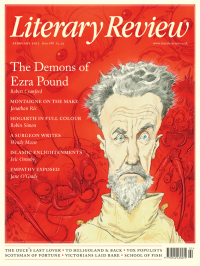Felicity Cloake
Sweetness & Blight
The Case Against Sugar
By Gary Taubes
Portobello Books 365pp £14.99
If ever a book were suited to the new year, a time for fresh starts, it’s this one – the meaty ‘argument for the prosecution’, as Gary Taubes puts it, in a theoretical trial at which sugar stands accused of being ‘the principal cause of the chronic diseases … most likely to kill us’. Taubes, an award-winning science and health journalist who has been relentless in his pursuit of the evils of refined carbohydrates for over fifteen years, isn’t short of facts to support his thesis. Indeed, The Case Against Sugar is so dense with them that the text can occasionally feel as indigestible as the richest of desserts. Yet having read the book, it seems clear that such an overwhelming barrage of hard evidence is what is required to challenge the widely held view of sugar as a largely ‘harmless pleasure’.
Taubes supplies ample statistics to back up his compelling claim that soaring sugar consumption over the last couple of centuries has been mirrored by a startling – and not entirely coincidental – increase in so-called ‘Western diseases’. To take just one example, until the mid-19th century diabetes was sufficiently rare to qualify as a medical curiosity. By 2012, nearly 50 per cent of the US population was diabetic or pre-diabetic, with an estimated 95 per cent of those affected suffering from the type 2 variety, a condition that, like heart disease, hypertension and gout, closely correlates with obesity.
For the last hundred years, the prevailing orthodoxy with regard to obesity has been very simple: take in more calories than you expend in exercise and you’re likely to become fat. This is rather too simple, according to Taubes, because it ignores the fact that not all calories are created

Sign Up to our newsletter
Receive free articles, highlights from the archive, news, details of prizes, and much more.@Lit_Review
Follow Literary Review on Twitter
Twitter Feed
Alfred, Lord Tennyson is practically a byword for old-fashioned Victorian grandeur, rarely pictured without a cravat and a serious beard.
Seamus Perry tries to picture him as a younger man.
Seamus Perry - Before the Beard
Seamus Perry: Before the Beard - The Boundless Deep: Young Tennyson, Science, and the Crisis of Belief by Richard Holmes
literaryreview.co.uk
Novelist Muriel Spark had a tongue that could produce both sugar and poison. It’s no surprise, then, that her letters make for a brilliant read.
@claire_harman considers some of the most entertaining.
Claire Harman - Fighting Words
Claire Harman: Fighting Words - The Letters of Muriel Spark, Volume 1: 1944-1963 by Dan Gunn
literaryreview.co.uk
Of all the articles I’ve published in recent years, this is *by far* my favourite.
✍️ On childhood, memory, and the sea - for @Lit_Review :
https://literaryreview.co.uk/flotsam-and-jetsam